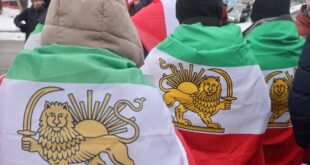 TEHRAN (Fars News Agency)- Iranian Parliament Speaker Gholam Ali Haddad Adel stressed that sacrilege of Islamic values and sanctities and the plots hatched against Islamic countries are all a product of the enemies’ fear from Muslim vigilance.
TEHRAN (Fars News Agency)- Iranian Parliament Speaker Gholam Ali Haddad Adel stressed that sacrilege of Islamic values and sanctities and the plots hatched against Islamic countries are all a product of the enemies’ fear from Muslim vigilance.
He further stated that the world arrogance, particularly the United States, are angry at Iran’s Islamic Revolution because the revolution revived Islamic identity and brought its teachings back to the scenes.
“They (enemies) desire a kind of religion for Muslims which does not have anything to do with politics, but our revolution brought Islam back to the center of attention and social context,” the chief lawmaker continued.
Saying that the Islamic Revolution of Iran has placed a great barrier in the way of hegemonic powers, Haddad Adel added, “Sacrilege of Islamic values and sanctities in some European countries all reflect the enemies’ fear from Muslims’ vigilance. They intend to put out the light of the Islamic Revolution and sowing seeds of discord among the world Muslims is one of the methods they have picked up for this purpose.”
The top legislative official reiterated that the differences existing between the Muslim Shiites and Sunnites in such countries as Afghanistan and Iraq are just a result of enemies’ plots, saying that enemies intended to exercise the same plots in Iran.
“Enemies of Islam intend to exercise the same policy and sow discord between the Shiites and Sunnites in a number of border provinces, such as Sistan and Balouchestan, Khuzestan, Kurdistan, etc. in a bid to hinder materialization of the goals of the Islamic Revolution and prevent our revolution from setting a paradigm for other countries,” he stated.
Meantime, the Iranian parliament speaker assured enemies that such measures may not produce any fruits for them as the history shows that the people residing in these regions are true supporters of Islam and Iran and that there has always been a very positive relationship between the religious leaders of the Shiites and Sunnites in the said regions, specially in Sistan and Balouchestan province.
 Eurasia Press & News
Eurasia Press & News



